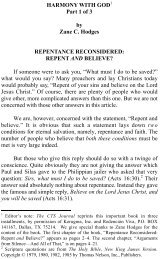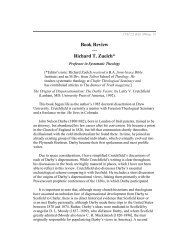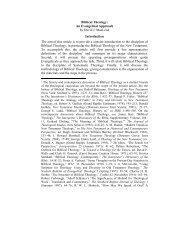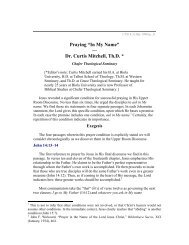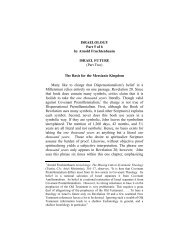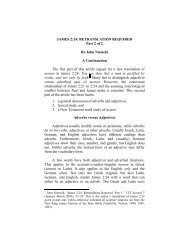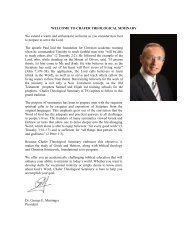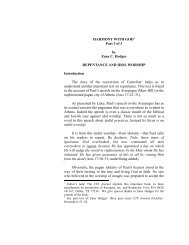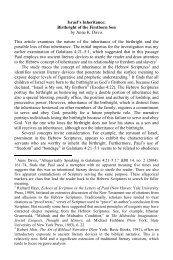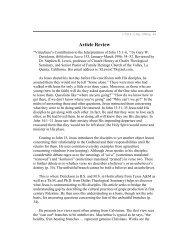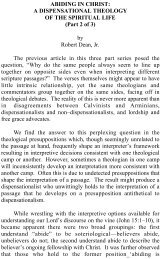Is Belief in Eternal Security Necessary for Justification? - Chafer ...
Is Belief in Eternal Security Necessary for Justification? - Chafer ...
Is Belief in Eternal Security Necessary for Justification? - Chafer ...
You also want an ePaper? Increase the reach of your titles
YUMPU automatically turns print PDFs into web optimized ePapers that Google loves.
52 CTS Journal 13 (Spr<strong>in</strong>g 2008)<br />
men.” Perhaps this reference to “life” <strong>in</strong>corporates both the concept of quantity<br />
(eternity) and quality (a richer, “abundant” life). If so, “life” <strong>in</strong> John is broader<br />
than just postresurrection life. It <strong>in</strong>cludes truth <strong>for</strong> unbelievers and truth <strong>for</strong><br />
believers.<br />
Even John 20:31 does not have to be understood as only evangelistic. The<br />
promise is “life” (not “eternal” life), just as it was <strong>in</strong> John 1:4. When unbelievers<br />
<strong>in</strong>itially believe, they receive life. But after <strong>in</strong>itial faith, there are more<br />
opportunities to believe, and our quality of life gets better and better as our faith<br />
grows. For example, <strong>in</strong> John 1:50 Jesus recognized that Nathaniel “believed” <strong>in</strong><br />
Him. But <strong>in</strong> John 2:11 Nathaniel believes aga<strong>in</strong>. In John 2:22 we have another<br />
record of the disciples believ<strong>in</strong>g <strong>in</strong> Him subsequent to their <strong>in</strong>itial belief. Even at<br />
the end of the Upper Room Discourse we f<strong>in</strong>d the disciples believ<strong>in</strong>g aga<strong>in</strong>:<br />
“Now . . . we believe that you came <strong>for</strong>th from God. Jesus answered them, ‘Do<br />
you now believe?’” And at the beg<strong>in</strong>n<strong>in</strong>g of the Upper Room Discourse we have<br />
Jesus mak<strong>in</strong>g a prediction about Judas <strong>in</strong> order that (h<strong>in</strong>a) the disciples yet aga<strong>in</strong><br />
might believe (subjunctive) after the prediction comes true that Jesus is who he<br />
claimed to be (John 13:19). So from the text itself we see a purpose of John—that<br />
believers might believe. This is not to say that ongo<strong>in</strong>g faith is a requirement <strong>for</strong><br />
justification. But it is a statement that ongo<strong>in</strong>g faith is a requirement <strong>for</strong> “life,” an<br />
existence <strong>in</strong> which the emphasis is not so much on quantity as on quality. After<br />
all, everyone exists <strong>for</strong>ever, assum<strong>in</strong>g that l<strong>in</strong>ear time cont<strong>in</strong>ues.<br />
We are not mak<strong>in</strong>g the claim here that John does not have an evangelistic<br />
thrust. We are just say<strong>in</strong>g it is not as cut and dry as some would claim. John<br />
seems to have some significant developments which do not fall under the<br />
evangelistic umbrella.<br />
<strong>Eternal</strong> Life Equals <strong>Eternal</strong> <strong>Security</strong><br />
Part of the confusion over plugg<strong>in</strong>g eternal security <strong>in</strong>to the justification equation<br />
is that the biblical use of “eternal” and ours are not the same <strong>in</strong> every <strong>in</strong>stance.<br />
When we say, “eternal security,” “eternal” has reference <strong>in</strong> our m<strong>in</strong>ds to l<strong>in</strong>ear<br />
time. But there are many biblical uses of “eternal,” even when descriptive of<br />
“life,” that have noth<strong>in</strong>g to do with l<strong>in</strong>ear time. <strong>Eternal</strong> life can be laid hold of by<br />
fight<strong>in</strong>g the good fight of faith (1 Timothy 6:12) and by giv<strong>in</strong>g money (1<br />
Timothy 6:17-19, as well as Galatians 6:6–9). In Titus 1:2 eternal life is<br />
connected with the full knowledge of truth and presented as a hope <strong>in</strong>stead of a<br />
guarantee. In Titus 3:7 people who have been justified are look<strong>in</strong>g <strong>for</strong>ward to an<br />
<strong>in</strong>heritance (often understood as a reward <strong>in</strong> Paul) and the hope of eternal life that<br />
goes along with such <strong>in</strong>heritance. A similar use is <strong>in</strong> Matthew 19:29, where<br />
<strong>in</strong>herit<strong>in</strong>g eternal life is presented by Jesus as a reward to those who have<br />
<strong>for</strong>saken th<strong>in</strong>gs <strong>in</strong> this life <strong>for</strong> His k<strong>in</strong>gdom’s cause. And <strong>in</strong> Romans 6:23 eternal<br />
life is presented as the daily experience of be<strong>in</strong>g free from the tyranny of our<br />
s<strong>in</strong>ful natures, not some sort of existence that lasts <strong>for</strong>ever <strong>in</strong> l<strong>in</strong>ear time.<br />
Accord<strong>in</strong>gly, Romans 6:23 is the gospel to sa<strong>in</strong>ts, not to s<strong>in</strong>ners.<br />
The po<strong>in</strong>t is that “eternal security,” as we understand it <strong>in</strong> modern theological<br />
circles (once saved always saved) is not an apt and equivalent substitution <strong>for</strong>



